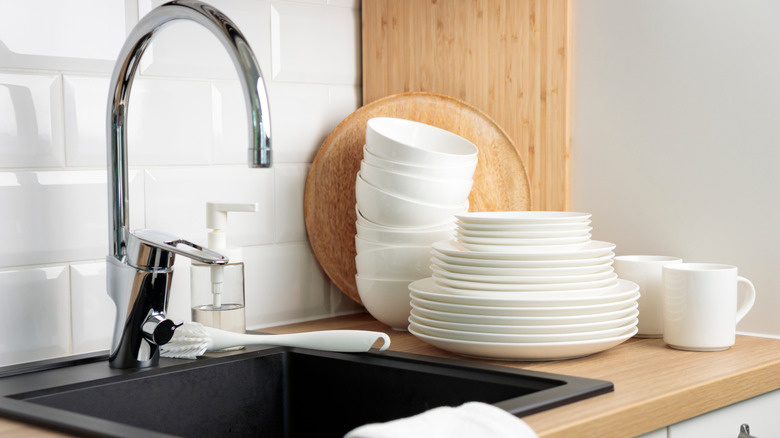Is It Always Polite For Guests To Offer To Do Dishes After A Dinner Party?
A dinner party — when done right — should be a vibe in itself. A host who prides themselves on curating an unforgettable experience for their guests will take painstaking measures to eliminate doubt of that happening. Everything, from the mood-setting background music, dinner party themes, appetizers, entrées, and desserts, has been thought out and every possible outcome considered.
Now, how do you thank someone for gifting you such a thoughtful experience? Is it proper etiquette for the guests to offer to do the dishes? Or, is your seemingly considerate gesture actually an imposition? Well, here's where I stand: I am diametrically opposed to putting guests to work during a dinner party.
If you wish to show your gratitude, offer to clear the table, but don't go any further. Clearing the table shows appreciation and respect for the effort the host put into the evening. It's a small gesture that helps move the night along and keeps things tidy without making anyone uncomfortable.
But, when it comes to busting out the heavy-duty gloves and applying elbow grease to pots or stacking plates in the dishwasher, that's a step too far, in my humble opinion. We have left courtesy and trespassed into the realm of intrusion. At the end of the day, a dinner party is about hospitality. Guests should feel welcomed and appreciated, and hosts should manage the behind-the-scenes work.
Why guests should offer to help clear the table
Clearing the table is a polite and practical way for guests to show their appreciation without overstepping. It's a low-effort task that doesn't take much time but can make a big difference for the host. Removing plates and glasses allows the host to enjoy the evening without feeling rushed to tidy up between courses or after dessert.
Offering to clear the table also shows awareness of the work that goes into hosting. Plus, it keeps things social — guests can chat while clearing plates, keeping the energy of the evening alive instead of leaving the host to handle everything alone. That said, guests should always follow the host's lead. If the host insists on clearing the table themselves or asks guests to relax, it's important to respect that boundary. The goal is to help in a way that feels natural and considerate, not to make the host feel like they're being micromanaged in their own home.
Why doing the dishes should be the host's responsibility
Personally, I can't help but look at a guest doing the dishes as robbing the host of their hard work somewhat. Hosting a dinner party is to enter into an unspoken contract whereby you agree to provide a good time for your guests. A host willingly takes on this task, assuming responsibility for everything, from preparation to cleanup. Asking or allowing guests to do dishes can jeopardize their dinner party experience, and a host worth their salt wouldn't want to risk that.
Dishes are also a more personal task than clearing the table. Everyone has their own system for cleaning — some people prefer to let things soak, while others want everything washed and dried immediately. It's easy for well-meaning guests to unintentionally disrupt the host's routine or cause unnecessary stress by taking over the kitchen.
Additionally, guests who dive into the dishes risk missing out on the social aspect of the party. Dinner parties are about connecting, not scrubbing pots. The host can always handle the dishes later, once the guests have left, giving everyone a chance to focus on enjoying the evening. So, before you insult your host by asking to hammer out the dishes, or worse, force them to acquiesce to your well-intentioned request, remember that a cleared plate, great convo, and unforgettable laughs are the best ways to show your host that their shindig was a hit.


